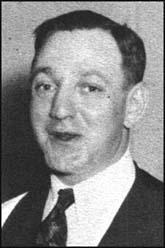Dutch Schultz

Arthur Flegenheimer, the son of a saloon-keeper, was born in New York on 6th August, 1902. He hated school and was often in trouble for non-attendance. He found work as a roofer but soon became involved in crime and served several periods of imprisonment.
After the Volstead Act was passed in 1919, Dutch Schultz established himself as a bootlegger. By 1931 he owned several illegal breweries and speakeasies and was one of the most important criminal figures in the Bronx. To protect his business, Schultz became involved in gang warfare. As with Al Capone, the authorities charged Schultz with income-tax avoidance.
Schultz was acquitted of the charge in 1933 but Fiorello La Guardia, the mayor of New York, was determined to have Schultz removed from his city. He instructed New York's special prosecutor, Thomas Dewey, to investigate Schultz's business interests. When Schultz heard the news, he began making plans to have Dewey assassinated. This worried other gang leaders as they knew that this would only increase La Guardia's determination to wipe out New York gangsterism.
Schultz was warned not to carry on with his murder plan. When he refused to take note of this demand, Louis Lepke Buchalter, one of New York's main gang leaders, paid Charlie Workman and Emmanuel Weiss to kill Schultz. On 23rd October, 1935, Dutch Schultz and three of his bodyguards, were killed while they were eating in a Newark restaurant.
